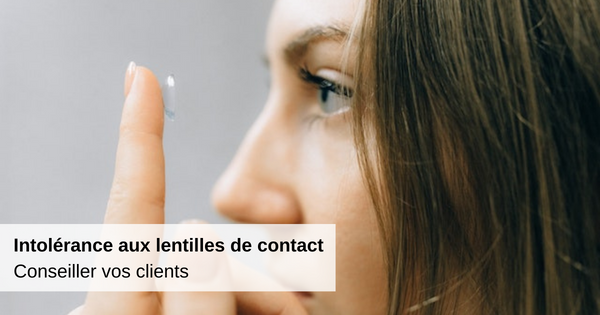Contact lens intolerance: how to help your clients?

Contact lenses have many advantages over glasses, the first being to track eye movement. They also offer the comfort of "being forgotten" and are not subject to the problems of fogging or scratches. Despite these good points, it can happen that the lenses become difficult to bear, even for regulars. So how do you advise your clients who suffer from contact lens intolerance?
Contact lens intolerance: what's going on?
When you tell your ophthalmologist that you want to wear contact lenses, he then offers a test to check that there is enough tears to properly moisten the lenses . The dryness of the eye is indeed its main enemy and the first cause of intolerance to contact lenses.

There are different symptoms and levels of intolerance. Indeed, here is a list of these symptoms that should warn your customers:
- Dry eye
- Irritation and/or itching
- Photophobia
- Foreign body sensation in the eye
- Inflammation of the eye
- Inability to wear contact lenses
- Pain when putting the lenses in
Some of them are to be taken extremely seriously because they can be signs of erosion or corneal ulcers. And in any case, two rules apply: it is imperative not to wear contact lenses and to do what is necessary to discover the cause of this discomfort.
Recall also essential rules, such as not rinsing your lenses with water, not sleeping with them, not wearing them for more than twelve hours a day.
How do you find out what's wrong?
Tingling sensations and pain, as soon as you put on your lenses, often point to a hygiene problem . This must be the first of the elements to confirm or deny. People who use contact lenses are often thought to be the ones who know best when it comes to hygiene rules. This is not necessarily the case. On the contrary, it can happen that with practice, we tend to worry a little less about this part. Yet it is essential.

Consider asking your customers about their habits. Do they wear their lenses longer than indicated? Have they changed cleaning products recently? Do they think about changing their case on a regular basis?
Once these elements have been highlighted, it will be appropriate to offer a new brand of contact lenses. But first of all, if no maintenance problem is finally retained, suggest that your customers go to consult an ophthalmologist. The latter can prevent, cure, or in the best case, eliminate the suspicion of an underlying disease, with more serious consequences.
Rigid contact lenses can be a good alternative when you can't stand your soft lenses anymore. Also in this case, the advice of a doctor remains essential.


